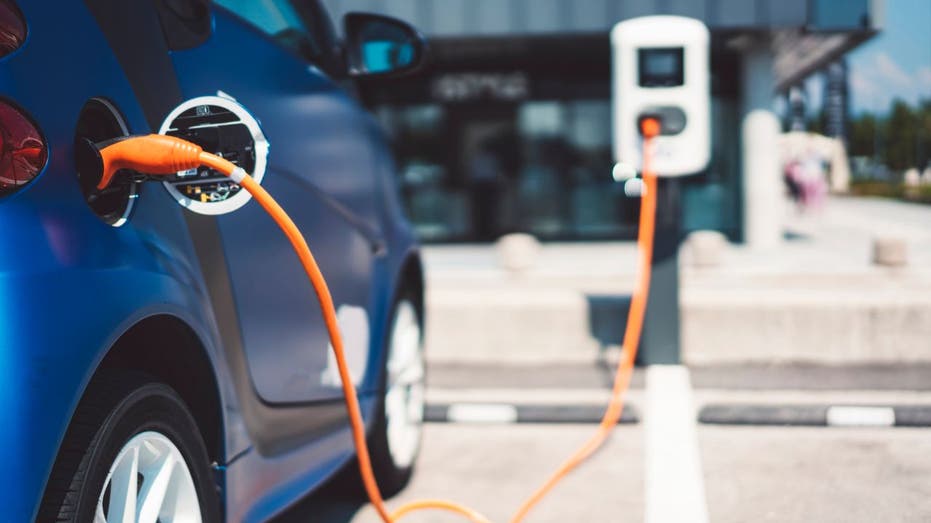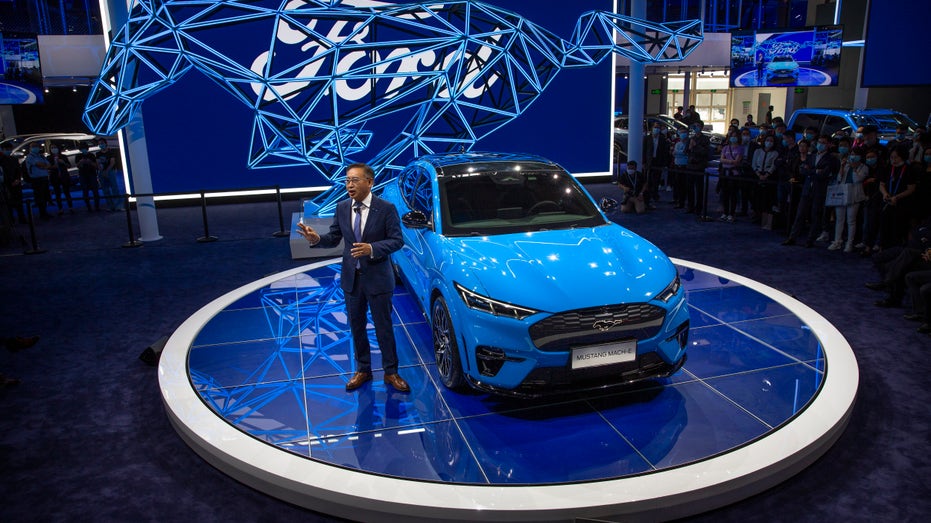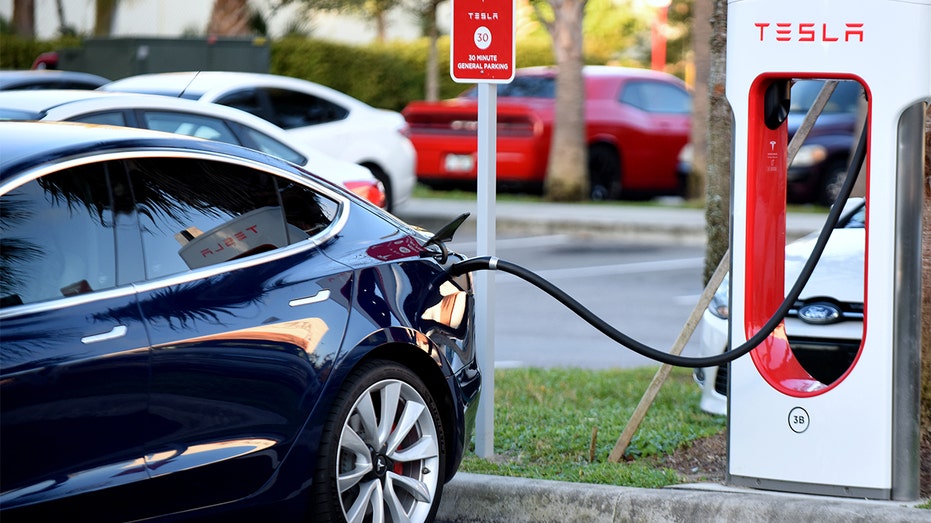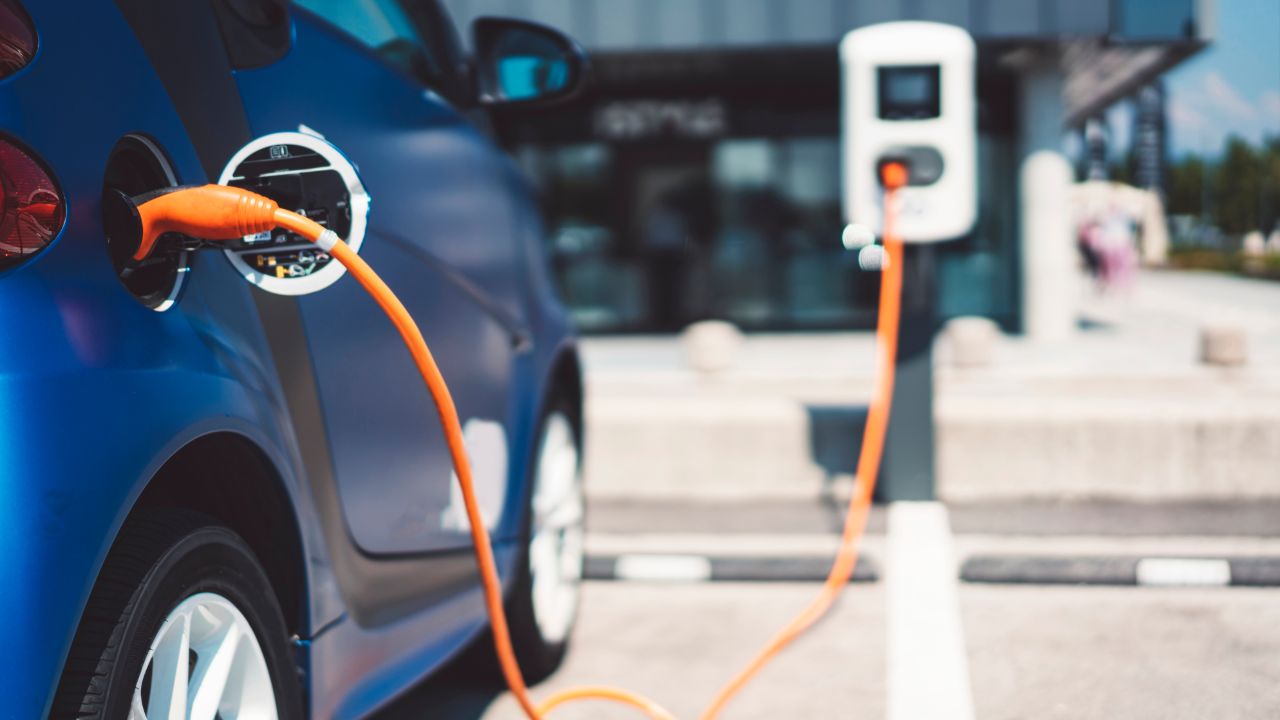Spread of electric cars sparks fights for control over charging
Utilities seek approval to upgrade infrastructure
Electric vehicles are widely seen as the automobile industry's future, but a battle is unfolding in states across America over who should control the charging stations that could gradually replace fuel pumps.
From Exelon Corp. to Southern California Edison, utilities have sought regulatory approval to invest millions of dollars in upgrading their infrastructure to prepare for charging and, in some cases, to own and operate chargers.
The proposals are sparking concerns from consumer advocates about higher electric rates and oil companies about subsidizing rivals. They are also drawing opposition from startups that say the successors to gas stations should be open to private-sector competition, not controlled by monopoly utilities.

Electric vehicle charging (iStock)
GM MAKES $2.2B INVESTMENT IN ELECTRIC VEHICLE PLANT
That debate is playing out in regulatory commissions throughout the U.S. as states and utilities promote wider adoption of electric vehicles. At stake are charging infrastructure investments expected to total more than $13 billion over the next five years, according to energy consulting firm Wood Mackenzie. That would cover roughly 3.2 million charging outlets.
Calvin Butler Jr., who leads Exelon's utilities business, said many states have grown more open to the idea of utilities becoming bigger players in charging as electric vehicles have struggled to take off in the U.S., where they make up only around 2% of new car sales.
"When the utilities are engaged, there's quicker adoption because the infrastructure is there," he said.
Major auto makers including General Motors Co. and Ford Motor Co. are accelerating production of electric vehicles, and a number of states have set ambitious EV goals -- most recently California, which aims to ban the sale of new gasoline-powered cars by 2035. But a patchy charging-station network remains a huge impediment to mass EV adoption.

Anning Chen, CEO of Ford China, presents a Ford Mustang Mach-E electric SUV at the Beijing International Automotive Exhibition. (AP Photo/Mark Schiefelbein)
ELECTRIC CAR MAKER FISKER TO GO PUBLIC WITH $2.9 BILLION VALUATION
Democratic presidential candidate Joe Biden has called for building more than 500,000 new public charging outlets in a decade as part of his plan to combat climate change. But exactly how that would happen is unclear. The U.S. currently has fewer than 100,000 public outlets, according to the Energy Department. President Trump, who has weakened federal tailpipe emissions targets, hasn't put forward an electric-vehicle charging plan, though he backed a 2019 transportation bill that would have provided $1 billion in grants to build alternative fueling infrastructure, including for electric vehicles.
Charging access currently varies widely by state, as does utility involvement, which can range from providing rebates on home chargers to preparing sites for public charging -- and even owning and operating the equipment needed to juice up electric vehicles.
As of September, regulators in 24 states had signed off on roughly $2.6 billion of utility investment in transportation electrification, according to Atlas Public Policy, a Washington, D.C., policy firm. More than half of that spending was authorized in California, where electric vehicle adoption is highest.
| Ticker | Security | Last | Change | Change % |
|---|---|---|---|---|
| GM | GENERAL MOTORS CO. | 84.24 | +0.94 | +1.13% |
| F | FORD MOTOR CO. | 13.80 | +0.08 | +0.58% |
ELON MUSK SAYS TESLA ‘VERY CLOSE' TO SELF-DRIVING CARS
Nearly a decade ago, California blocked utilities from owning most charging equipment, citing concerns about potentially stifling competition. But the nation's most populous state reversed course in 2014, seeking to spur electrification.
Regulators across the country have since been wrestling with similar questions, generating a patchwork of rules.
Maryland regulators signed off last year on a pilot program allowing subsidiaries of Exelon and FirstEnergy Corp. to own and operate public charging stations on government property, provided that the drivers who use them cover at least some of the costs.
Months later, the District of Columbia rejected an Exelon subsidiary's request to own public chargers, saying independent charging companies had it covered.
Some charging firms argue utilities shouldn't be given monopolies on car charging, though they might need to play a role in connecting rural customers and building stations where they would otherwise be uneconomical.
"Maybe the utility should be the supplier of last resort," said Cathy Zoi, chief executive of charging network EVgo Services LLC, which operates more than 800 charging stations in 34 states.

A Tesla electric car is seen parked at a charging station in Altamonte Springs, Florida. (Paul Hennessy/NurPhoto via Getty Images)
THE NEW PRICE OF TESLA’S MODEL S IS BASED ON SEX AND POT JOKES
Utility charging investments generally are expected to raise customers' electricity bills, at least initially. California recently approved the largest charging program by a single utility to date: a $436 million initiative by Southern California Edison, an arm of Edison International. The company said it expects the program to increase the average residential customer's bill by around 50 cents a month.
But utilities and other advocates of electrification point to studies indicating greater EV adoption could help reduce electricity rates over time, by giving utilities more revenue to help cover system upgrades.
Proponents of having utilities build charging networks also argue that they have the scale to do so more quickly, which would lead to faster EV adoption and environmental improvements such as lower greenhouse gas emissions and cleaner air. While the investments most directly help EV owners, "they accrue immediate benefits for everyone," said Jill Anderson, a Southern California Edison senior vice president.
GET FOX BUSINESS ON THE GO BY CLICKING HERE
Some consumer advocates are wary of approving extensive utility investment in charging, citing the cost to ratepayers.
"It's like, 'Pay me now, and maybe someday your rates will be less,'" said Stefanie Brand, who advocates on behalf of ratepayers for the state of New Jersey, where regulators have yet to sign off on any utility proposals to invest in electric vehicle charging. "I don't think it makes sense to build it hoping that they will come."
Groups representing oil-and-gas companies, which stand to lose market share as people embrace electric vehicles, also have criticized utility charging proposals.
"These utilities should not be able to use their monopoly power to use all of their customers' resources to build investments that definitely won't benefit everybody, and may or may not be economical at this point, " said Derrick Morgan, who leads federal and regulatory affairs at the American Fuel & Petrochemical Manufacturers, a trade organization.
Utility executives said their companies have long been used to further government policy objectives deemed to be in the public interest, such as improving energy efficiency.
"This isn't just about letting market forces work," said Mike Calviou, senior vice president for strategy and regulation at National Grid PLC's U.S. division.




















